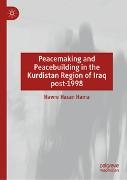Read more
This book argues although peace in the KRI has lasted for over a quarter-century, it remains a form of negative peace due to weak institutions. Achieving positive peace requires addressing political, legal, and security challenges
It examines the factors that have shaped both the stability and fragility of peace settlements since the 1998 Washington Agreement. By combining theoretical models with in-depth empirical data, the book explores the interplay of power-sharing, economic development, and third-party intervention—arguing that these elements are pivotal to the durability of peace settlements in post-conflict societies.
To secure a lasting and positive peace, the KRI must confront deeply rooted political, legal, and military challenges that continue to undermine progress. This includes establishing political and legal accountability and depoliticizing the Kurdish armed forces. Such a transition requires not only genuine political will and committed internal reforms, but also sustained international support to prevent future armed conflict and lay the foundation for a stable and prosperous KRI.
Dr. Hawre Hasan Hama is an Assistant Professor at the University of Sulaimani. His work has been published in many leading academic journals, including Ethnicities, Ethnopolitics, Journal of Asian and African Studies, British Journal of Middle Eastern Studies, Middle Eastern Studies, World Affairs, Asian Journal of Comparative Politics, Digest of Middle East Studies, Contemporary Review of the Middle East, National Identities, Asian Affairs, and The Journal of International Communication. In addition, he has published numerous research articles in Kurdish.
List of contents
Chapter 1 Theoretical Framework: Peacebuilding After Civil War.- Chapter 2 What Explains the Stability of Peace settlement between the Kurdistan Democratic Party (KDP) and the Patriotic Union of Kurdistan (PUK).- Chapter 3 The role of Economic Development in the stability of the peace settlement between the KDP and the PUK.- Chapter 4 The third-party Role (the United States) in the stability of the peace settlement between the KDP and the PUK.- Chapter 5 Negative Peace in Iraqi Kurdistan.- Chapter 6 Transforming Negative Peace into Positive Peace in Iraqi Kurdistan.
About the author
Dr. Hawre Hasan Hama is an Assistant Professor at the University of Sulaimani. His work has been published in many leading academic journals, including Ethnicities, Ethnopolitics, Journal of Asian and African Studies, British Journal of Middle Eastern Studies, Middle Eastern Studies, World Affairs, Asian Journal of Comparative Politics, Digest of Middle East Studies, Contemporary Review of the Middle East, National Identities, Asian Affairs, and The Journal of International Communication. In addition, he has published numerous research articles in Kurdish.
Summary
This book argues although peace in the KRI has lasted for over a quarter-century, it remains a form of negative peace due to weak institutions. Achieving positive peace requires addressing political, legal, and security challenges
It examines the factors that have shaped both the stability and fragility of peace settlements since the 1998 Washington Agreement. By combining theoretical models with in-depth empirical data, the book explores the interplay of power-sharing, economic development, and third-party intervention—arguing that these elements are pivotal to the durability of peace settlements in post-conflict societies.
To secure a lasting and positive peace, the KRI must confront deeply rooted political, legal, and military challenges that continue to undermine progress. This includes establishing political and legal accountability and depoliticizing the Kurdish armed forces. Such a transition requires not only genuine political will and committed internal reforms, but also sustained international support to prevent future armed conflict and lay the foundation for a stable and prosperous KRI.

